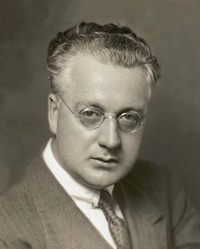St. John Greer Ervine facts for kids
St John Greer Ervine (born December 28, 1883 – died January 24, 1971) was an important Irish writer. He wrote many things, including biographies (life stories), novels (fiction books), and plays for the theatre. He also worked as a theatre manager. Ervine was the most famous writer from Ulster (Northern Ireland) in the early 1900s. His plays even influenced other well-known Irish writers like W. B. Yeats and Sean O'Casey. His novel, The Wayward Man, was one of the first books to explore what life was like in Belfast.
Contents
Life Story of St John Ervine
Early Life and Moving to London
St John Ervine was born as John Greer Irvine in Ballymacarrett, a part of east Belfast, in 1883. His family had lived in County Down for 300 years. His parents were deaf-mute. His father, who was a printer, died soon after Ervine was born. His family then moved in with his grandmother, who ran a small shop.
When he was 17, Ervine started working as an insurance clerk in Belfast. Soon after, he moved to London.
Starting His Writing Career
In London, Ervine met the famous writer George Bernard Shaw. This meeting inspired him to start writing articles for newspapers and his first plays. He changed his name to St John Ervine, thinking it sounded better for his writing goals.
His first full-length play, Mixed Marriage, was shown at Dublin's Abbey Theatre in 1911. It was very popular and ran many times, helping the theatre earn money. W. B. Yeats praised Ervine's plays because they showed the real lives of people in Northern Ireland.
Working at the Abbey Theatre
In 1915, Yeats asked Ervine to become the general manager of the Abbey Theatre. Ervine did a great job, and the theatre became financially successful by putting on many popular comedies. However, Ervine was very strict with the actors. He was also very upset by the Easter Rising in 1916, which was a rebellion in Ireland. These issues led to disagreements, and Ervine resigned from the Abbey Theatre in 1916.
After leaving the theatre, Ervine joined the army. He was commissioned as a temporary second lieutenant in the Royal Dublin Fusiliers. He was wounded in Flanders during World War I, and sadly, one of his legs had to be removed. He left the army in 1919 due to his injuries.
Successful Plays and Novels
Throughout the 1920s and 1930s, Ervine wrote many successful plays. These were often "drawing-room comedies," which are plays about polite society. Many of his plays, like Anthony and Anna (1926) and The First Mrs. Fraser (1929), were performed for up to two years in London's West End.
In 1936, his play Boyd's Shop was produced. This play became very important for Northern Irish drama for many years. Another writer, Arnold Bennett, said Ervine was an "unequalled" playwright in England. He praised Ervine's plays for being skillful, having good ideas, and being very popular. From 1919 to 1939, Ervine also worked as a theatre reviewer for The Observer newspaper.
Besides plays, Ervine also wrote several novels. His most successful novel was The Wayward Man (1927). It was even reprinted in 1936 as one of the first paperbacks by Allen Lane's Penguin Books. He also wrote important biographies about famous people. These included Craigavon and Edward Carson, who were leaders in Unionism (a political movement in Ireland). He also wrote about William Booth, Oscar Wilde, and George Bernard Shaw. His biography of Shaw, Bernard Shaw: His Life, Work, and Friends (1956), won the James Tait Black Memorial Prize.
Ervine often wrote about Belfast in his novels. In The Wayward Man, he wrote that he had "never met anyone who was not depressed by Belfast." Another writer, Sean O'Faolain, said Ervine was the only Belfast writer who tried to capture the "realism" of the city.
In 2014, The Wayward Man was republished. This was part of an effort to bring attention back to Northern Irish novelists who had been overlooked.
Personal Life
In 1911, Ervine married Leonora Mary Davis (who died in 1965). She was a teacher, actress, and playwright from Birmingham. In the 1940s, they made their home in Seaton, England.
St John Ervine passed away on January 24, 1971, in Iping, Sussex.
Selected Plays
- Mixed Marriage (1910)
- The Magnanimous Lover (1912)
- The Critics (1913)
- Jane Clegg (1913)
- The Orangeman (1914)
- John Ferguson (1915)
- The Island of Saints and How to Get Out of It (1920)
- The Ship (1922)
- The Lady of Belmont (1924), a sequel to The Merchant of Venice.
- The First Mrs. Fraser (1929)
- Boyd's Shop (1936)
- William John Mawhinny (1940)
- Friends and Relations (1941)
- My Brother Tom (1952)
- Ballyfarland's Festival (1953)
- Martha (1955)
A recent production of Mixed Marriage was performed at the Finborough Theatre in London from October 4 to 29, 2011. It received very good reviews.
Novels
- The Tailor of Charing Cross (1912)
- Mrs Martin's Man (1914)
- Alice and a Family (1915)
- Changing Winds (1917)
- The Foolish Lovers (1920)
- The Wayward Man (1927) (2014, Turnpike Books, Dublin. ISBN: 978-0957233614)
See also
- List of Northern Irish writers
 | Jessica Watkins |
 | Robert Henry Lawrence Jr. |
 | Mae Jemison |
 | Sian Proctor |
 | Guion Bluford |


